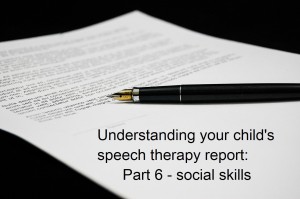This is the sixth and final part of our series on understanding your child’s speech and language therapy report. Check out parts one, two, three, four and five if you missed them. Today focusses on social skills (or pragmatic language). This is a huge area, so this will only be a very brief whistle-stop tour of various terms that you might see.
When a child has a language problem there is (understandably) a huge focus on what they can or cannot say, or how clear their words are. While this is very important, a huge part of communication is the non-verbal aspects of language. It’s these aspects that can make the difference between a child with few words who is a very good communicator, and another with the same language level who struggles much more with getting their message across. Likewise a child can have a very good vocabulary and no difficulties with sentence structure, but still struggle with the communicative aspects of language.
The first thing to say is that, if it is not the primary area of concern, your child’s report may not say much about social skills, or may comment only very briefly. This is because it is a difficult area to assess and often requires a playground or classroom observation (or nursery observation for a pre-schooler). In a 1:1 setting, some comments may be made, but it is very difficult to make a full assessment of social skills, especially if the therapist is meeting your child for the first time. The therapist may just talk to you and base their comments on what you, as a parent, have said. If it is thought necessary however, the therapist may also carry out a classroom observation or nursery visit and make a fuller assessment of social skills.
A distinction may be made between your child’s interaction with other children and their interaction with adults. Likewise your therapist may want to find out how your child responds in a group as opposed to a 1:1 situation. Different situations pose challenges for different children.
With young children in particular, the therapist may ask and observe a lot about how they play. Do they play with a range of toys or stick with the same ones? Do they play alongside other children or with them? Can they adapt their play to include another person? Do they play imaginatively? Your child’s report may talk about symbolic play. This refers to pretending one object is something else (for example, using a stick as a phone). The next level on from that is imaginative play. This refers to the role playing that children do – pretending to be a princess or fire-fighter or superhero and making up long sequences and stories related to the character. Many children with language difficulties find this kind of play challenging as it requires a high level of understanding of the world as well as imagination. In order to play in this way, children need well developed inner language, and this can often be a stumbling block for children with language difficulties.
With older children the report may focus less on play skills, and more on some of the skills involved in conversation. Eye contact is one of these important skills. Does your child look at people when they are talking? What about when they are listening? Do they use and understand facial expressions appropriately?
Another aspect is turn-taking. This means not just taking turns within a game (though this is part of it) but understanding the turn-taking aspect of conversation. Do they talk constantly without letting anyone else speak? Do they pick up cues to tell them when it is their turn to talk? Do they know how to start and end a conversation appropriately? You may also find a comment on topic maintenance. This refers to your child’s ability to stick to the topic of a conversation without veering off onto something else. Some children have favourite topics which they talk about repetitively, regardless of the topic of the conversation.
Repair strategies are really important. What does your child do when they are not understood or when they don’t understand? Are they able to ask or communicate via facial expression when they are confused or need clarification?
The report may talk about emotions and your child’s ability to understand their own emotions and those of others. This includes facial expression, body language, tone of voice and understanding of situations as a whole. Some children find it really difficult to pick up clues from the situation about what others may be thinking or feeling. They may find it hard to predict what might happen in a given situation and this can make the world a very confusing place. For example, if someone walked into the room carrying a cake with candles on, would your child realise it was someone’s birthday? Or if they repeatedly break a rule, do they understand that this will get them into trouble?
Although it is far wider, language does also come into an assessment of social skills. The therapist may comment on your child’s ability to understand less literal aspects of language such as jokes, idioms and “inferencing”. I spoke about these in the comprehension post here, but there is some overlap with social skills, so these aspects may be talked about in either section of the report.
As you can see, social skills covers a huge range of skills. As in all of the posts in this series, I have just been able to raise questions and explain terminology today; hopefully we can talk about all of these skills and how to help in more detail another time.
We hope you’ve found this series of posts useful. If there are any terms we’ve missed that you’d like us to explain do let us know and we’ll do our best to add them in!







Leave a Reply